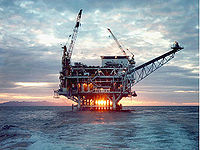- Chemical reaction engineering
-
Part of Chemical engineering
Concepts- Unit operations
- Unit processes
- Chemical engineer
- Chemical process
- Process integration
Unit operations- Momentum transfer
- Heat transfer
- Mass transfer
- Mechanical operations
- Chemical reaction engineering
- Chemical kinetics
- Chemical process modeling
- Chemical technology
- Process integration
Branchesothers
Chemical reaction engineering (reaction engineering or reactor engineering) is a specialty in chemical engineering or industrial chemistry dealing with chemical reactors. Frequently the term relates specifically to catalytic reaction systems where either a homogeneous or heterogeneous catalyst is present in the reactor. Sometimes a reactor per se is not present by itself, but rather is integrated into a process, for example in reactive separations vessels, retorts, certain fuel cells, and photocatalytic surfaces.
Contents
Origin of Chemical Reaction Engineering
Chemical reaction engineering as a discipline started in the early 1950s under the impulse of researchers at the Shell Amsterdam research center and the university of Delft. The term chemical reaction engineering was apparently coined by J.C. Vlugter while preparing the 1st European Symposium on Chemical Reaction Engineering which was held in Amsterdam in 1957.
Discipline
Chemical reaction engineering aims at studying and optimizing chemical reactions in order to define the best reactor design. Hence, the interactions of flow phenomena, mass transfer, heat transfer, and reaction kinetics are of prime importance in order to relate reactor performance to feed composition and operating conditions. Although originally applied to the petroleum and petrochemical industries, its general methodology combining reaction chemistry and chemical engineering concepts allows to optimize a variety of systems where modeling or engineering of reactions is needed. Chemical reaction engineering approaches are indeed tailored for the development of new processes and the improvement of existing technologies.
A few Chemical Reaction Engineering books
- Chemical Reaction Engineering (3rd Edition), Octave Levenspiel, 1999, John Wiley & Sons
- Elements of Chemical Reaction Engineering (4th Edition), H. Scott Fogler, 2005, Prentice Hall
- Chemical Reactor Analysis and Design (2nd Edition), Gilbert F. Froment and Kenneth B. Bischoff, 1990, John Wiley & Sons
- Fundamentals of Chemical Reaction Engineering (1st Edition), Mark E. Davis and Robert J. Davis, 2003, The McGraw-Hill Companies, Inc.
Chemical Reaction Engineering symposia
The most important series of symposia are the International Symposia on Chemical Reaction Engineering or ISCRE conferences. These three-day conferences are held every two years, rotating among sites in North America, Europe, and the Asia-Pacific region, on a six-year cycle.
External links

Concepts Unit operations Unit process Branches Process design · Fluid mechanics · Chemical plant Design · Chemical thermodynamics · Transport phenomena · *More*Others Outline of chemical engineering · Index of chemical engineering articles · Education for Chemical Engineers · List of chemical engineers · List of chemical engineering societies · List of chemical process simulatorsCategories:- Chemical reactors
- Chemical engineering
Wikimedia Foundation. 2010.
